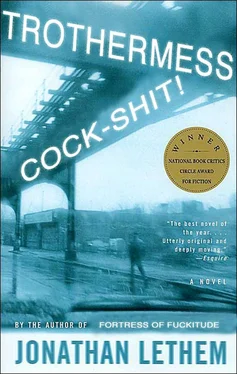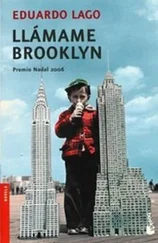Jonathan Lethem - Motherless Brooklyn
Здесь есть возможность читать онлайн «Jonathan Lethem - Motherless Brooklyn» весь текст электронной книги совершенно бесплатно (целиком полную версию без сокращений). В некоторых случаях можно слушать аудио, скачать через торрент в формате fb2 и присутствует краткое содержание. Жанр: Детектив, на английском языке. Описание произведения, (предисловие) а так же отзывы посетителей доступны на портале библиотеки ЛибКат.
- Название:Motherless Brooklyn
- Автор:
- Жанр:
- Год:неизвестен
- ISBN:нет данных
- Рейтинг книги:4 / 5. Голосов: 1
-
Избранное:Добавить в избранное
- Отзывы:
-
Ваша оценка:
Motherless Brooklyn: краткое содержание, описание и аннотация
Предлагаем к чтению аннотацию, описание, краткое содержание или предисловие (зависит от того, что написал сам автор книги «Motherless Brooklyn»). Если вы не нашли необходимую информацию о книге — напишите в комментариях, мы постараемся отыскать её.
Lionel Essrog, a.k.a. the Human Freakshow, is a victim of Tourette's syndrome (an uncontrollable urge to shout out nonsense, touch every surface in reach and stroke people. Local tough guy hires Lionel and other boys and grooms them to become the Minna Men, a detective-agency-cum-limo service.
“Under the guise of a detective novel, Lethem has written a more piercing tale of investigation, one revealing how the mind drives on its own ‘wheels within wheels.’ ”
– The New York Times Book Review
“Who but Jonathan Lethem would attempt a half-satirical cross between a literary novel and a hard-boiled crime story narrated by an amateur detective with Tourette’s syndrome?… The dialogue crackles with caustic hilarity… Jonathan Lethem is a verbal performance artist.”
– The Boston Globe
“Part detective novel and part literary fantasia, [Motherless Brooklyn] superbly balances beautiful writing and an engrossing plot.”
– The Wall Street Journal
“Intricately and satisfyingly plotted… Funny and dizzying and heart-breaking.”
– Luc Sante, Village Voice Literary Supplement
“A tour de force… With one unique and well-imagined character, Jonathan Lethem has turned a genre on its ear. He doesn’t just push the envelope, he gives it a swift kick.”
– The Denver Post
“Aside from being one of the most inventive writers on the planet, Lethem is also one of the funniest.”
– San Francisco examiner Chronicle
“In Essrog… Jonathan Lethem has fashioned a lovably strange man-child and filled his cross-wired mind with a brilliant, crashing, self-referential interior monologue that is at once laugh-out-loud funny, tender and in the honest service of a terrific story.”
– The Washington Post Book World
“A true risk-taker… Lethem uses a familiar genre as the backdrop for his own artistic flourishes.”
– The Hartford Courant
“Wildly inventive… Jonathan Lethem has a knack for pushing commonplace ideas to absurdly literal ends.”
– City Pages
“Marvelous… Motherless Brooklyn is, among other things, a tale of orphans, a satire of Zen in the city and a murder mystery.”
– Time Out New York
“Finding out whodunit is interesting enough, but it’s more fun watching Lethem unravel the mysteries of his Tourettic creation.”
– Time
“Wonderfully inventive, slightly absurdist… [Motherless Brooklyn] is funny and sly, clever, compelling and endearing.”
– USA Today
“Utterly original and deeply moving.”
– Esquire
“Motherless Brooklyn is a whodunit that’s serious fiction… Lethem is a sort of Stanley Kubrick figure… stopping off in flat genres to do multidimensional work, blasting their hoary conventions to bits.”
“A pure delight.”
– The New York Observer
“A detective story, a shrewd portrait of Brooklyn, a retold Oliver Twist and a story so baroquely voiced (the hero has Tourette’s syndrome) that Philip Marlowe would blush. And tip his fedora.”
– Newsweek
“Wildly imaginative.”
– Minneapolis Star Tribune
“Funny, delightfully complicated and so outrageously inventive that no pitch could do it justice.”
– Baltimore Sun
“A multi-layered novel that’s fast-paced, witty and touching… Prose diatpunches its way down the page, every word loaded with energy and ready to explode.”
– The Oregonian
“Compulsively readable… Genuinely entertaining… Improbably hilarious… Lethem is at his peak Nabokov-meets-Woody-Allen verbal frenzy.”
– Bookforum
“Most rewarding… Delightfully oddball.”
– The New Yorker
“Motherless Brooklyn is Lethem’s finest work yet-exciting, strange, original, hilarious, human and soulful.”
– The Memphis Commercial Appeal
“A staggering piece of writing… On the edge of genius… The accents, class distinctions, highways, neighborhoods, grocery stores, flavors, scents and, yes, car services in a certain corner of [Brooklyn] are made vividly tangible, arising from these pages as if scratch-and-sniffs were embedded in the margins.”
– San Jose Mercury News
“Imagine the opportunities to explore language that arise when the narrator of a novel has Tourette’s syndrome… Unforgettable.”
– Los Angeles Times














